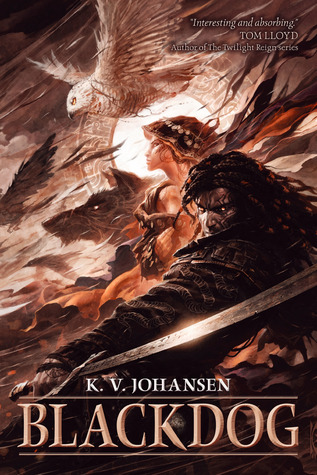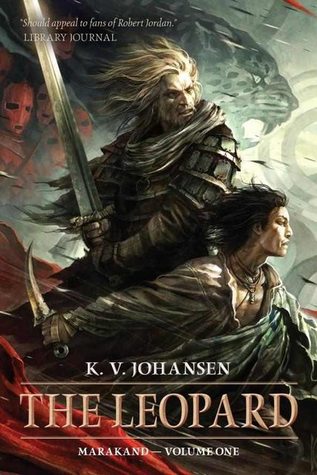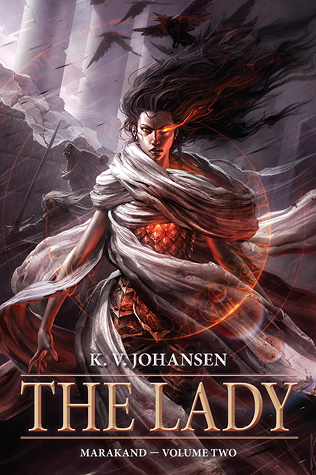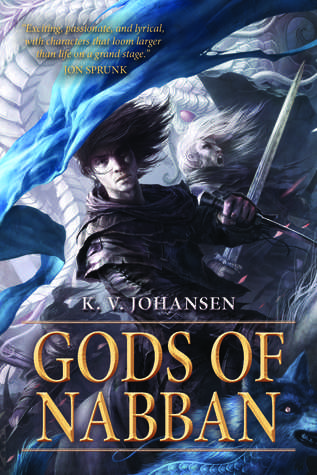Interview with K.V. Johansen
I’m so pleased to welcome K V Johansen to the Hive today. I’ve been a fan of her Gods of the Caravan Road before it had a series name, and the books are some of my absolute favourites. They taught me the value of following your own heart to find great books for you, not just looking at what other people like (that said, I recommend them to everyone whenever I can!).
K.V. Johansen was born in Kingston, Ontario, Canada. She has an M.A. from the Centre for Medieval Studies at the University of Toronto and a second M.A. in English Literature at McMaster University. In 2014, she was an instructor at the Science Fiction Foundation’s Masterclass in Literary Criticism held in London.
In addition to writing fantasy for adults, she is also the author of two critically-acclaimed works on the history of children’s fantasy literature, two short story collections, and a number of books for children and teens. Many of her books have been translated into French, Macedonian, and Danish. She lives in Sackville, New Brunswick, Canada, where she writes books, walks the dog, plays classical guitar indifferent well and rock almost unrecognisably. But she’s getting better at it. Really.
We’re here to celebrate books, so let’s open with a great book you’ve read recently:
I came across Robert V.S. Reddick’s Master Assassins in a chance mention by Carol Berg, an author whose work I admire greatly, so I had to check it out. Very glad I did! It has what I want in a secondary-world fantasy — great characters with some depth and complexity, a world that’s rich with living detail, a plot that holds together well, and good prose. There’s lots of action and suspense, but a decent amount of thinking too; the characters come to life through real connections and conflicts, not superficial banter. The world has a lot of history behind the situation the protagonists are up against — soldiers on the run for killing the sons of their tyrant-prophet — and you can see things going on in the shadows off the edges, too, in the quarantining of their continent by the rest of the world, which promise later developments. What really makes this one stand out in particular is the relationship between the brothers (one of whom might be mad, possessed, or just someone with a child’s psychological development in an otherwise adult mind), which is balanced on this edge between affection and anger verging on hatred. It’s not a simple relationship and it’s very well executed. I’m very much looking forward to the next book in the series.
I’m looking forward (with a tinge of sadness) to the final installment of your Gods of the Caravan Road series, aptly titled The Last Road, due out in May I believe (plenty of time for folks to catch up!). What can you tell us about it?
In The Last Road, there’s a new god leading an army out of the western lands of the old empire of Tiypur. The All-Holy is devouring the gods and goddesses of the lands between, forcibly converting their folk and binding their souls to himself. This has been foreshadowed from the beginning — look for the icon that the Old Lady of the temple of Attalissa has on her wall, back when Tamghat conquers Lissavakail in Blackdog, and remember the Lady of Marakand’s terror and her obsession with making the city a fortress to bar the road east.
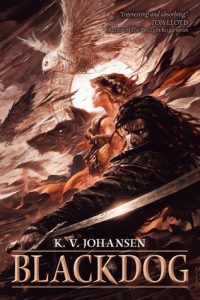 The Last Road returns to the main overarching plot, the story of the seven devils and Moth’s quest to destroy her fellows. I wanted to gather up all the threads that had followed the evolving nature of the gods of the earth, the wizard-bonded devils in the world, and the humans and immortals dragged into their struggles. The world has been changing as these histories unfold; even the nature of the relationship between humans and the Old Great Gods is open to question. One thread returns to Holla-Sayan, the Blackdog — he’s been through friends and family dying while he lives on, immortal, no longer fully human. Now his homeland, the Western Grass, is being conquered by the All-Holy and its gods destroyed. We also get to see how the former assassin Ahjvar’s long road of healing from possession by a psychopathic ghost has altered him and his lover, Ghu, the god of Nabban, as well. Most of all, I think, this one is finally Moth’s story (and Mikki’s) again. The series was always meant to be about her, underneath everything else. Not many people have read the true start of the cycle, which is the short story “The Storyteller” in The Storyteller and Other Tales. It’s an important story for Moth and Mikki about the choices Moth makes, and how she comes to take up the sword Lakkariss. “The Storyteller” is not a side-story but the beginning of the epic, the seven devils escaping their graves.
The Last Road returns to the main overarching plot, the story of the seven devils and Moth’s quest to destroy her fellows. I wanted to gather up all the threads that had followed the evolving nature of the gods of the earth, the wizard-bonded devils in the world, and the humans and immortals dragged into their struggles. The world has been changing as these histories unfold; even the nature of the relationship between humans and the Old Great Gods is open to question. One thread returns to Holla-Sayan, the Blackdog — he’s been through friends and family dying while he lives on, immortal, no longer fully human. Now his homeland, the Western Grass, is being conquered by the All-Holy and its gods destroyed. We also get to see how the former assassin Ahjvar’s long road of healing from possession by a psychopathic ghost has altered him and his lover, Ghu, the god of Nabban, as well. Most of all, I think, this one is finally Moth’s story (and Mikki’s) again. The series was always meant to be about her, underneath everything else. Not many people have read the true start of the cycle, which is the short story “The Storyteller” in The Storyteller and Other Tales. It’s an important story for Moth and Mikki about the choices Moth makes, and how she comes to take up the sword Lakkariss. “The Storyteller” is not a side-story but the beginning of the epic, the seven devils escaping their graves.
There are new characters in The Last Road as well. Jolanan, a Westgrasslander, is fighting in the losing war against the All-Holy after the death of her goddess; her path intersects with Holla-Sayan’s. Another is Nikeh, a young woman from the west who, as a child, escaped the massacre of her village and was adopted by a travelling Nabbani warrior-scholar she calls Teacher; she’s been brought up with the skills of a scholar and a spy of the Nabbani Wind in the Reeds without ever questioning that this is a very strange way to grow up. And my favourite is Ailan, a young man living on the streets of Star River Crossing in what is now the Taren Confederacy, who develops a serious case of hero-worship for our favourite semi-divine undead assassin. I love Ailan. I’d like to write some stuff just about him …
Now I’m even more impatient! Going back to the start, Blackdog is an amazing standalone, packing a whole epic arc into one volume, and the others are all fairly self-contained (counting Marakand as one). Was it always going to be a series? How did it evolve?
I always conceived of it as something that would be more than one book. I think of it as a cycle of tales, like the Matter of Britain, the linked Arthurian stories of the middle ages. They intersect with and overlap one another but are separate stories about different people. The thread weaving through it all and holding it together was always going to be Moth and Mikki, wandering into other people’s stories, leaving again. But Moth turned out to be struggling with depression all through it, so by Gods of Nabban she’s just wandered right off out of everything and doesn’t return until the epilogue. In The Last Road — well, you’ll see. She’s back. And angry. But her battle with depression becomes more explicit there and drives some significant events of the story. On the other hand, Moth and Yeh-Lin were originally one character who ended up becoming two, back before I’d really sorted out the seven devils, so when Moth isn’t there in the main story of a book, Yeh-Lin tends to show up, taking over that role as the warrior-devil entangled in the action.
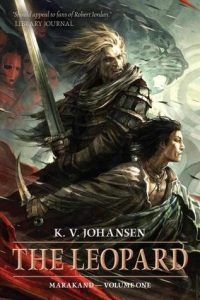 Some of the lore seems incredibly deep, and key characters (who start off relatively minor) have such fully realised personalities and epic histories. How long has this world and its characters lived with you?
Some of the lore seems incredibly deep, and key characters (who start off relatively minor) have such fully realised personalities and epic histories. How long has this world and its characters lived with you?
It wasn’t planned out in advance — I find that stories always evolve around me as I write them, so I tend to be writing and researching simultaneously. Characters as well as landscapes grow as I get interested in them. There are so many characters who stayed minor, who have a complex, never-written story behind them that’s vividly there in my head. Proto-Moth, in fact, belonged to her own world and was just starting to take on some life there when she wandered over into what was meant to be Holla-Sayan’s world. Holla’s world, initially, was limited to an alleyway in a mountain town, where he was being possessed by some sort of dog-demon as a battle raged around him in the night. So everything after that is me figuring out why and how and what on earth does Moth have to do with it? It grows sort of like a tree from the acorn of the initial character-in-a-situation, throwing out branches as it goes on, thickening its main trunk. Then that shape reverses its flow and turns into a river, and other streams rush into it … How many nature metaphors can I jumble together? Almost every new character has to have their own story if they’re going to feel real to me and act like a real person, even if that story never gets written out. I wrote most of Blackdog in 2004, with interruptions from the children’s book career. So that’s fifteen years now, with this world growing in my head. By 2007 Blackdog was written; I was looking for a publisher and working on a sequel that was going to focus on Ivah in Nabban. And then it was going to focus on Zora’s older sister, a gate-captain in the city guard of Marakand … no plot, apparently, survives contact with Ahjvar and Ghu, the dead king and his young god.
How does a Canadian author end up writing Silk Road-inspired fantasy, and so vividly as well? Have you travelled the world?
I’m a very landscape-rooted person. I need to know the world I’m moving in, whether I’m writing or reading, or visiting a new real place. The story of Blackdog grew out of the characters of Holla-Sayan and Moth, but the world of that story was coloured by a documentary series that I watched back in 93-94, Realms of the Russian Bear, about the natural history of the former Soviet Union. I found the accompanying book a few years later and have read it I don’t know how many times. It just settled into my mind and became one of my vital landscapes, somehow. So that was a large part of it. Another part of that falls under your next question, so I’ve answered it there …
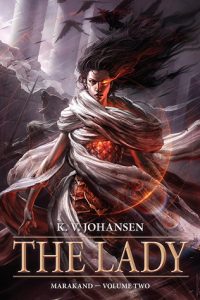 You mention your academic background in your bio above, and you’ve written some non-fiction as well. How has that informed your fantasy writing? Do you ever have to restrain the academic side in your fiction writing?
You mention your academic background in your bio above, and you’ve written some non-fiction as well. How has that informed your fantasy writing? Do you ever have to restrain the academic side in your fiction writing?
I’ve been doing research all my life, about anything that catches my interest or that I have to deal with, because I need to get the details right, to understand things and how they work, whatever ‘it’ is — some element of human psychology, Bactrian camels, how a tile roof is actually attached, how you go about preparing birchbark for writing on. It drives me crazy if I don’t know these things so I can see them in my head when I need them. So I’m very good at researching things but it’s for my own understanding, and once I understand, I can play with it. I’m not interested in writing realistic historical fiction; what goes into the story as I write it ends up being what I need to make my story real for myself, to create a new reality, not all the other stuff I may have read or written pages of notes about in my research notebook. Once I’ve got that kind of life of a place and a time and cosmology that never existed in the real world in my head, the whole world of the story becomes very vivid and alive, and I don’t need to put it all in the book at once, it’s just there, unfolding as and when the light of the story falls on it or when the characters need it as a foundation for who and how they are. The story’s always about the people; what’s driving the characters, be it memory, hope, fear, their past or their future, good things or horrors. There’s a synergy between the complex psychology of the characters and the world they move through that means even when I consciously think, ‘this thing would be an interesting detail’, it’ll just vanish if it turns out not to be part of the world that the characters themselves demand and then create through what they’re doing or thinking or moving within. So no, I don’t find I consciously have to restrain it; it just seems natural to research, throw it all into the compost, and let the story grow as it will from that, so that you only see what matters. (Though I think quite a lot matters.)
I know you’ve published quite a few books for younger readers. Was writing adult fantasy something you always wanted to do? Was it a conscious decision to switch or just the right time? Did you consider a name change (I hear that’s pretty common)?
I’d always been writing adult fantasy. The children’s fantasy began with Torrie and a story I wrote to amuse myself, the kind of old British children’s fantasy I loved. It’s just chance that it was my children’s writing that found a publisher first, so that ‘children’s writer’ ended up being my first career. I didn’t opt to use a pseudonym for Blackdog and The Storyteller because I thought that in Canada at least, I already was a name at that point and I should carry that over. I think it was the wrong decision, now. It would have been better to have not had that ‘children’s writer’ label following me; I think it may have affected expectations of Blackdog, at least in Canada, especially as Attalissa/Pakdhala is a child for part of the book. There was an assumption that I was a children’s writer and the goddess was a child so it was a book about a girl-goddess growing up — which was just so wrong. It’s about a man possessed and wondering if he’s going crazy, realizing he’s fallen into this huge responsibility for a child-goddess who is neither his child nor his goddess, trapped and heading unavoidably towards a battle with an enemy he doesn’t think he can possibly withstand. Attalissa is very much a person with her own story — but she’s not the hero of the book.
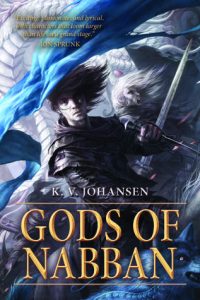 Now that we’ve said goodbye to the Caravan Road, what are you working on next?
Now that we’ve said goodbye to the Caravan Road, what are you working on next?
I took half a year and wrote an actual Lit novel, or CanLit, as we say here. No swordfights, no demons, no immortals and battles, just a story about a couple of millennial guys quietly sorting out their lives … a story about depression, rock music, gardens, and trying to survive as a creative person who can’t deal with working customer-service-type jobs in the twenty-first century. (Of course, one of them is talking to his dead brother …) It was just this idea that I had two years ago, a sudden and intense story that showed up all at once, as if the characters had been friends of mine all along. They were just there and I already knew all about them, bang. Weird. It was simmering the whole time I was finishing The Last Road and the moment that was done I wrote it. Let’s go on calling it The Secret Project for now. It’s quite a funny story, really, given what it’s about, and a happy one. I’d gotten extremely exhausted, mentally and physically, feeling as though I’d been going on and on forever — severe burn-out. The Secret Project was a bit restorative. I’m about to begin shopping it around — and it probably will be under a pseudonym, once I find a home for it. The current project, though, is fantasy, because that’s my natural home. I’m not far enough into it to say much, but it’s going to be rooted mostly in a single city and be seventeenth-century-ish in technology. A first person narration, too, I think. So far. All subject to change! What I’ve been reading, or rereading, feeling my way into it, so far has been books on the Elizabethan secret service, the English Civil War, Philby, Gordievsky … and letting my childhood fondness for Buchan out to play. While looking at maps of Constantinople. And then there’s this scheme Tom Lloyd and I have, where I’m going to write a God Fragments novella and maybe someday he’ll play with a Gods of the Caravan Road short story, but that idea is still at the fermentation stage and who knows what will come of it?
That all sounds great (we read Tom’s Stranger of Tempest here). For those who follow you on Twitter, what is the OFJ, and who is Mr Wicked?
The OFJ is the Off-Farm-Job, a phrase that comes from my years writing for farm magazines. I was the NB stringer the Atlantic Beef Quarterly for a long time and it’s mostly small cow-calf operations here in the Maritimes, with the farm getting by on one or both of the farming couple having an off-farm job as well. And writing has gone the same way — you have to have another job to support your real work. I used to be a full-time writer but as the 21st century moved along the situation for writers got worse and worse and we’d only been scraping by to start with. I’ve eventually ended up working in a library, thank goodness, because there was a point when I was desperate enough I was thinking about applying at a call centre, but I used to try to avoid telling people what my part-time job was because that ended up with my writing not being taken seriously, being dismissed as a cute little hobby brought on by excessive exposure to the soppier sort of children’s books, not anything that mattered or that I needed to make a living from.
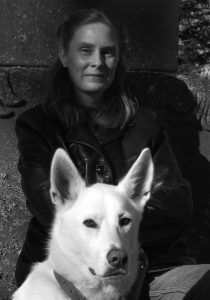 Mr Wicked is Ivan, the Wicked White Dog, who has a pseudonym because even dogs need privacy on social media — but I outed him in another interview a few years back. We were hoping he’d be a laid back, Ivan Vorpatril, Drones Club kind of personality, but we got a Miles instead. He’s a husky/German Shepherd (Alsatian to you) mix, snow white, and worryingly intelligent. You have to be careful what you say, because the dog will understand half of it. There’s a bit of Ivan, and of my late dog Pippin, in Ghu’s dragon-dogs Jui and Jiot.
Mr Wicked is Ivan, the Wicked White Dog, who has a pseudonym because even dogs need privacy on social media — but I outed him in another interview a few years back. We were hoping he’d be a laid back, Ivan Vorpatril, Drones Club kind of personality, but we got a Miles instead. He’s a husky/German Shepherd (Alsatian to you) mix, snow white, and worryingly intelligent. You have to be careful what you say, because the dog will understand half of it. There’s a bit of Ivan, and of my late dog Pippin, in Ghu’s dragon-dogs Jui and Jiot.
What’s the most (and/or least) helpful piece of writing advice you’ve ever received?
Least helpful: I tried to take a creative writing course during my B.A. My prof sneered at what I was doing and said, “You don’t need character development in science fiction.” I dropped the course and dropped him as my faculty advisor as well, because his total disdain for my work was something I didn’t need to carry.
Most helpful: It wasn’t a single piece of advice, but I became friends with the late Douglas Lochhead, a Canadian poet, when I was still an undergrad. He read and made suggestions on my endless novel (which I’d been rewriting and rewriting since I was fourteen, the hero of which eventually turned up in bits and pieces spread out between Holla-Sayan and Ahjvar) and mentored me one summer when I received a grant to work on a creative writing project. Even though fantasy wasn’t his thing at all, words were, and he didn’t look on a poetic prose style mixed with 1920s Modernism, and genre fiction full of shapeshifters and demons and assassins, as incompatible. Plus he praised the way I approached writing fights and battle scenes, which, coming from someone who’d trained as an artilleryman in the Second World War, was heartening. He never doubted that I was doing my own writing right and that kind of confidence in me as an artist was something I very much needed.
Hopefully we’ve found some new readers for your own excellent books, so tell us about another book/series that’s excellent, but underappreciated or a bit obscure:
There are a couple that come to mind: a more recent one is the trilogy Moshui: The Books of Stone and Water by Daniel Fox, beginning with Dragon in Chains in 2009, followed by Jade Man’s Skin and Hidden Cities. Daniel Fox is one of Chaz Brenchley’s pseudonyms and Chaz writes incredible, beautiful, intensely poetic stuff and gripping human stories whatever genre he turns to and whatever name he uses. (I mean, I even enjoyed a serial killer murder mystery by him and I hate serial killer mysteries.) This series is secondary world fantasy, influenced, I believe, in part by a trip he made to Taiwan. I’m certain anyone who likes Gods of the Caravan Road would really like this series too. It’s poetic, it’s intense, it’s a rich, deep, complex world full of complex, strange, maybe not-entirely-human people trying to sort things out in the aftermath of an empire-shattering war. Plus dragons, and the magic of jade, and deities. He’s so good at making worlds, landscapes, and people that are real, painfully real, sometimes. Intense, poetic, knife-edged — those are the ideas that I end up coming back to, trying to describe his writing.
An older series that never got the attention it deserved is the late Louise Cooper’s eight-book Indigo saga, which began in 1988 with Nemesis. The story follows a princess who releases a number of demons into the world. The deaths of her own family are only the start of the destruction they cause. She’s condemned by the mother-goddess to find and destroy these demons to atone for her sin, however long it may take. Calling herself Indigo, her only companion a talking wolf named Grimya who is blessed by the goddess with immortality so that Indigo won’t be entirely alone on her quest, she wanders the world. The demons don’t always take the form that Indigo, or the reader, expects, and aren’t always obvious. It’s not a monster of the week sort of adventure, but a journey through a wide variety of stories as Indigo and Grimya grow into their new lives, and the ending is quite powerful and unexpected. I suspect that subconsciously it, and Cherryh’s Morgaine, were both an influence on the shape that Gods of the Caravan Road took, at least until Ahjvar and Ghu hijacked the middle part of the story. There aren’t that many wandering female heroes out there.
Finally, a Fantasy Hive staple is what we like to call a ‘shark elevator pitch’. (It’s exactly the same as an elevator pitch, but with sharks.) (Well, one shark. Which, by the way, is currently picking between its rows of teeth to try and dislodge the remains of the last author who stepped onto its elevator.)
Ahem. So: why should readers check out your work? A shark elevator pitch of your own book(s) in no more than three sentences – go!
Wounded, angry, complicated, lost people on the edges — of their societies, of their lives, of humanity — struggle their way towards something better, trying to save something, maybe even themselves. The worlds are broad and layered and rich, spilling off the map and back into the mists of legend. There are swordfights, shapeshifters, vulnerable gods where you least expect them — and the words are deep and dark, the words are oak and silver and edged in fire; the words sing.
To close, where can people find you online?
My website is at www.kvj.ca and from there, in addition to the important stuff, like news updates and info about my books (and links to places you can buy them!), you can find my very rarely sent newsletter and very rarely updated blog. Mostly — and far too often — I’m on Twitter: @kvjohansen.
That’s it, and thanks so much for answering my/our questions!
K.V. Johansen is the author of numerous fantasy series, including The Warlocks of Talverdin, The Cassandra Virus, and Gods of the Caravan Road, the final book of which will be released in May 2019.

